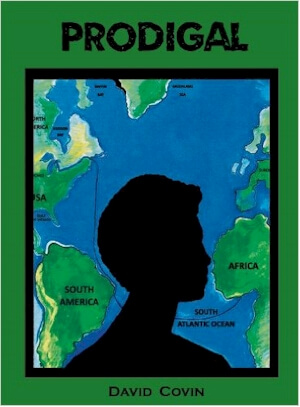Book Review: Prodigal
by David Covin
Blue Nile Press (Jun 06, 2014)
Fiction, Paperback, 343 pages
More Info ▶
Read an Excerpt from Prodigal
Book Reviewed by Chauncey Ridley
David Covin’s Prodigal is a well-tuned engine of richly resonant, polysemous form firing on all cylinders: a hip, ripping thriller set in the mean streets of Chicago’s Southside and the meaner, grittier streets of an urban Brazilian favela, a moving historical allegory of African prodigals stranded in North and South America by the transatlantic slave trade, and an inspiring chronicle of moral growth anagogically crowned by the homeward trajectory of the prodigal axé or life force of Brazilian Candomblé and its pantheon of orixas.
The opening two-thirds of the novel flash back and forth between James Henderson’s criminal career in Chicago and the parallel story of his rebirth as Zhamess, found washed up on a beach in the Bay of All Saints, Salvador, Brazil by a street gang of thieving, scavenging boys from the favela, Liberdade, calling themselves the Wolf Pack. With no passport, no money, no memory of his passage and no idea of where he is, lacking even a phrase book for translation between English and Portuguese, James relives in reverse the trauma of African slaves’ delivery, as helpless cargo, onto the alien shores of the Americas: although his landfall is greeted not by bondage but by the indefatigable Wolf Pack who, despite their own parentless poverty, feed and shelter him in the dangerous favela until his spiritual training begins at the tereiro, sanctuary of Salvador’s Candomblé congregation.
Obtuse yet protean, James in Chicago is a complex anti-hero capable of anything, hence, very compelling. For the intrepid Brown Bombers—his Chicago street gang while still in high school—the stresses of fight, flight, and crime are relentless. After dropping out of high school, his tireless work ethic and good looks fuel his meteoric success as a small time racketeer. Amoral yet sentimental, salacious yet artistic, by twenty five he is rich, running for his life from more powerful and murderously efficient racketeers, and grateful to surrender his entire bankroll to stowaway aboard a cargo ship going anywhere, only to be pitched overboard to drift with the incoming tide off Salvador, without a pause in the ship’s course further south. That opening two-thirds of the novel is fast-paced with riveting action scenes, and it rewards rereading for its subtly interwoven foreshadowing of the novel’s spiritual outcome.
The final third of the novel is more contemplative. The current of narrative slows yet deepens and widens as James/Zhamess penetrates the closed worlds of the favela and Brazilian Candomblé, learns the history of the transatlantic slave trade which he never learned in Chicago schools, and rediscovers his lost identity as the prodigal son of Yemenja, orixa of rivers and the “Ocean sea:” whereupon, he commits himself to the itinerant mission of bearing witness, throughout the shores of the Atlantic, to the homecoming of Candomblé to Dahomey, to his own homecoming, and to the redemptive life force suffusing all descendants of the African slave diaspora.
The novel’s epiphany illuminates not only that pan-Atlantic axé or life force but also North and South American prodigals’ widely varying degrees of awareness. At one extreme of awareness is James in Chicago. Before his transformation, he is even more oblivious of his exile than the Wolf Pack of the favela and no less a product of his sordid, urban, North American environment than Bigger Thomas of Richard Wright’s Native Son. At the opposite extreme, the priests and priestesses of Brazilian Candomblé yearn homeward to Dahomey, having prepared for generations to return and be recognized as offspring of Yoruba theology. Hence, the necessary first leg of James’s Atlantic odyssey is from Chicago to Salvador, where he transforms into Zhamess in preparation for his enlightened voyage home to Africa, not to stay, but to reclaim his heritage and highest purpose.
There is nothing at all self-abnegating about Zhamess’s spiritual enlightenment. Transcendent, not as God is transcendent, but by virtue of his final commitment to the enlightenment of all prodigals, he remains a muscular, vigorous individual:
“…Exu - opened the gateway - and brought me through – into this world.
I don’t remember a thing about the gateway…
“…[Yet,] I know the gateway in a way the iawos [Candomblé
nitiates] do not. When the orixas step into this world through the iawos, it is the
orixa’ who is here –who speaks, who dances – not the iawo. But with me… I –
have come through the gate – and I act in the world.” (Prodigal 249)
If Zhamess is an aspect of the Candomblé Word made flesh, then Covin’s Prodigal is its printed, sacred text. Unique, immersive, action-packed, morally redemptive and spiritually uplifting, it merits wide distribution and serious critical attention.

